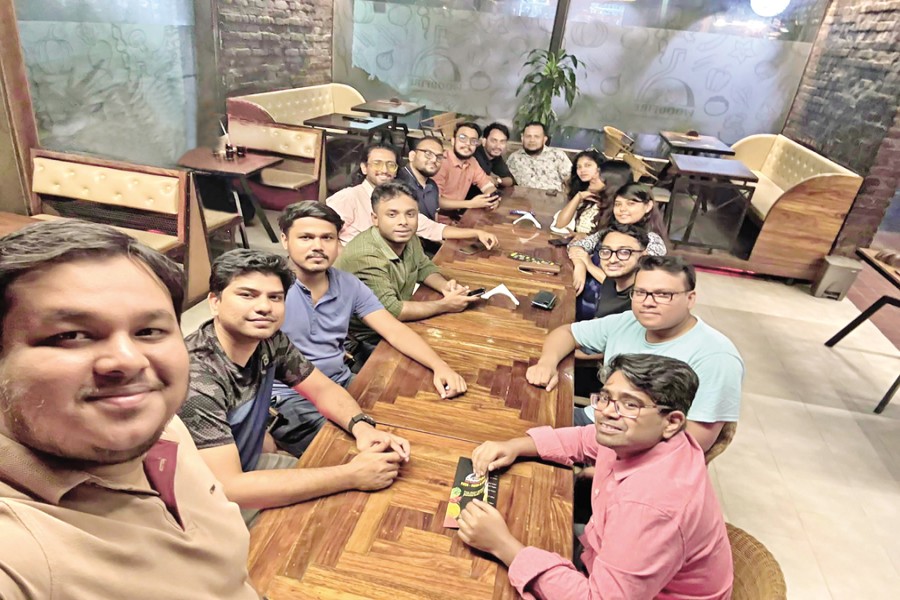From rooftop attic to an outsourcing success
An IT firm built from scratch
Story of Md Tanbirur Rahman

Published :
Updated :

Md Tanbirur Rahman took a bold step in 2017 that would change his life. He started on his own as a remote employee for a US-based firm. As his workload and reputation grew, he planned to establish a company in Bangladesh. And with only a few team members and a small attic space on his building's rooftop, he founded Micron Infosys back in 2022. His goal was to make a name in the ITES industry by providing reliable services to US-based clients. In two years, Micron Infosys has grown to over 15 employees. It stands as an example of what's possible with vision, passion, and the courage to start small.
Starting from scratch wasn't easy. Tanbirur had gained valuable experience working at Kazi IT Center, where he spent two years in a senior operations role. He learned the ins and outs of the outsourcing industry. When his contract with Kazi IT Center ended, he decided to take a chance on himself rather than renew his agreement. However, being new to the market brought plenty of challenges. There is a lot of potential in Bangladesh's outsourcing industry but finding clients is never easy. If one asks any freelancer, they will share how many proposals one has to submit in Upwork to land one meaningful client.
Many Bangladeshi firms use email to contact potential clients, but these messages often end up in spam folders. Tanbirur decided to circumvent this problem. Instead of relying on emails, he started making direct calls to clients using Google Voice. Back then, this feature was still relatively unknown in Bangladesh and was free.
"I found that calling clients made a big difference," he says. "It's easier to build a real connection over the phone, and clients appreciate hearing directly from us." His direct approach paid off to build rapport with clients.
With time, Micron Infosys grew, but he faced another hurdle that many Bangladeshi freelancers know all too well; limited access to international payment systems like PayPal. Many US clients preferred to use PayPal, but since it isn't available in Bangladesh, he had to find workarounds. His friends and family in the US helped him process payments so that he could continue serving clients without any disruption.
Tanbirur shares that outsourcing and remote work are still seen as the last option in Bangladesh. "Many people in Bangladesh still don't see outsourcing as a real career," he says. "It's often considered a fallback option if you don't get a 'dream job.' But I've always enjoyed this work, and I'm focused on showing what's possible in this industry."
According to Tanbirur, Bangladesh's outsourcing sector is growing quickly, and new opportunities are opening up in fields like real estate, digital marketing, virtual assistance, etc. He believes that outsourcing has unique advantages. Bangladeshi youths can start without a formal degree, work remotely, and develop valuable skills. But he emphasises that communication, passion and professionalism are the keys to success. "Good communication is essential to survive in this field," he notes. "You have to have clarity, be responsive and professional."
Talking on what makes a successful entrepreneur, Tanbirur believes that practical knowledge, passion, leadership, and attention to quality are crucial. "It's not about how much work you do but how well you do it," he says. "Successful entrepreneurs focus on quality over quantity. They also work with commitment. Proper planning and sticking to your plan is also very important."
Tanbirur shared an observation of recent graduates. He often notices a lack of professionalism and integrity in candidates he interviews, even those with degrees from top universities. "Too many graduates lack the basic work ethics-like timeliness, responsibility, and professionalism-that are needed to succeed," he says. "You can have all the degrees, but if you don't respect deadlines or aren't committed, it's hard to go far."
His advice to the upcoming entrepreneurs is simple, which is to focus on skill development and discipline. "Be goal-oriented and professional," he says.
His firm's entry into the USA's outsourcing market is a case study of persistence and passion. He did the less flashy yet necessary work by generating leads from open sources, sending emails, and calling relevant companies. He even created a brochure that explained his services, pricing, and why clients should choose his firm or him to execute the tasks.
Tanbirur’s firm works for various real estate clients and helps them in various tasks.
Tanbirur dreams of a collaborative future for Bangladesh's IT industry. "I'd love to see a hub where experienced entrepreneurs and newcomers can work together," he shares. "If we create a united community, then we can compete with established outsourcing nations like India and the Philippines."
A humble beginning from a small attic office to a growing outsourcing firm is an inspiring example of how Bangladeshi entrepreneurs can make a mark on the global stage. His journey shows that with dedication and a commitment to quality, even the smallest beginnings can grow into something remarkable.
hishamuddinkhan@gmail.com


 For all latest news, follow The Financial Express Google News channel.
For all latest news, follow The Financial Express Google News channel.